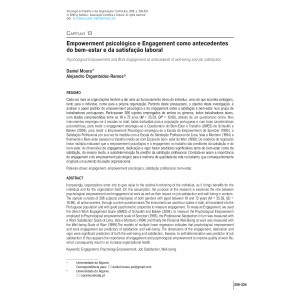Alarcon, G. M., & Lyons, J. B. (2011). The relationship of engagement and job satisfaction in working samples. The Journal of Psychology, 145(5), 463-480. doi:10.1080/00223980.2011.584083
Bakker, A. B., & Demerouti, E. (2007). The Job Demands-Resources model: State of the art. Journal of Managerial Psychology, 22(3), 309-328. doi:10.1108/02683940710733115
Bakker, A. B., & Demerouti, E. (2008). Toward a model of work engagement. Career Development International, 13(3), 209-223. doi:10.1108/13620430810870476
Cho, J., Laschinger, H. K. S., & Wong, C. (2006). Workplace empowerment, work engagement and organizational commitment of bew graduate nurses. Nursing Leadership, 19(3), 43-60. doi:10.12927/cjnl.2006.18368
Demerouti, E., & Bakker, A. B. (2011). The job demands-resources model: Challenges for future research. SA Journal of Industrial Psychology, 37(2), 1-9. doi:10.4102/sajip.v37i2.974
Durán, M. A., Extremera, N., Montalbán, F. M., & Rey, L. (2005). Engagement y burnout en el ámbito docente: Análisis de sus relaciones con la satisfacción laboral y vital en una muestra de profesores. Revista de Psicología del Trabajo y de las Organizaciones, 21(1-2), 145-158.
Fuller, B., Morrison, R., Jones, L., Bridger, D., & Brown, V. (1999). The effects of psychological empowerment on transformational leadership and job satisfaction. The Journal of Social Psychology, 139(3), 389-391. doi:10.1080/00224549909598396
Hu, Q., Schaufeli, W. B., & Taris, T. (2011). The job demands-resources model: An analsis of additive and join effects of demands and resources. Journal of Vocational Behavior, 79, 181-190. doi:10.1016/j.jvb.2010.12.009
Koberg, C. S., Boss, R. W., Senjem, J. C., & Goodman, E. A. (1999). Antecedents and outcomes of empowerment: Empirical evidence from the health care industry. Group & Organization Management, 24(1), 71-91. doi:10.1177/1059601199241005
Laschinger, H. K. S., Finegan, J., Shamian, J., & Wilk, P. (2001). Impact of structural and psychological empowerment on job strain in nursing work settings: Expanding Kanter’s model. Journal of Nursing Administration, 31(5), 260-272. doi:10.1097/00005110-200105000-00006
Laschinger, H. K. S., Wong, C., & Grau, A. (2013). Authentic leadership, empowerment, and burnout: A comparison in new graduates and experienced nurses. Journal of Nursing Management, 21(3), 541-552. doi:10.1111/j.1365-2834.2012.01375.x
Lautizi, M., Laschinger, H. K. S., & Ravazzolo, S. (2009). Workplace empowerment, job satisfaction, and job stress among Italian mental health nurses: An exploratory study. Journal of Nursing Management, 17/4), 446-452. doi:10.1111/j.1365-2834.2009.00984.x
Lima, M., Vala, J., & Monteiro, M. B. (1994). Culturas organizacionais. In M. B. Vala, M. B. Monteiro, & A. Caetano (Eds.), Psicologia social e das organizações - Estudos em empresas portuguesas. Lisboa: Celta Editora.
MacKinnon, D., Fairchild, A., & Fritz, M. (2007). Mediation analysis. Annual Review of Psychology, 58(2), 593-618.
Marôco, J. (2010). Análise de equações estruturais. Fundamentos teóricos, software & aplicações. Lisboa: ReportNumber, Lda.
Mendoza-Sierra, M. I., León-Jariego, J. C., Orgambídez-Ramos, A., & Borrego-Alés, Y. (2009). Evidencias de validez de la adaptación española de la organizational empowerment scale Revista de Psicología del Trabajo y de las Organizaciones, 25(1), 17-28.
Mendoza-Sierra, M. I., Orgambídez-Ramos, A., León-Jariego, J. C., & García-Carrasco, A. M. (2014). Service Climate as a Mediator of Organizational Empowerment in Customer-Service Employees. The Spanish Journal of Psychology, 17(E4), 1-10. doi:10.1017/sjp.2014.4
Moura, D., Orgambídez-Ramos, A., & Gonçalves, G. (2014). Role stress and work engagement as antecedents of job satisfaction: Results from Portugal. Europe´s Journal of Psychology, 10(2), 291-300. doi:10.5964/ejop.v10i2.714
Orgambídez-Ramos, A., & Borrego-Alés, Y. (2014). Empowering employees: Structural empowerment as antecedent of job satisfaction in university settings. Psychological Thought, 7(1), 28-36. doi:10.5964/psyct.v7i1.88
Orgambídez-Ramos, A., Borrego-Alés, Y., & Mendoza-Sierra, M. I. (2014). Role stress and work engagement as antecedents of job satisfaction in Spanish workers. Journal of Industrial Engineering and Management, 7(1), 360-372. doi:10.3926/jiem.992
Podsakoff, P., MacKenzie, S., Lee, J., & Podsakoff, N. (2003). Common method biases in behavioral research: A critical review of the literature and recommended remedies. Journal of Applied Psychology, 88(5), 879-903. doi:10.1037/0021-9010.88.5.879
Saks, A. M. (2006). Antecedents and consequences of employee engagement. Journal of Managerial Psychology, 21(7), 600-619. doi:10.1108/02683940610690169
Salanova, M., & Schaufeli, W. B. (2009). El engagement en el trabajo: Cuando el trabajo se convierte en pasión. Madrid: Pirámide.
Santos, J., & Gonçalves, G. (2010). Contribuição para a adaptação portuguesa da escala de bem-estar no trabalho de Warr (1990). Psicologia, Educação e Cultura, XIV(2), 285-300.
Santos, J., Gonçalves, G., Orgambídez-Ramos, A., Mendoza-Sierra, M. I., & Borrego-Alés, Y. (2014). Estudo de adaptação da escala de empowerment psicológico de Spreitzer (1995) numa amostra portuguesa. Avaliação Psicológica, 13(3), 56-61.
Schaufeli, W. B., & Bakker, A. B. (2004). Job demands, job resources, and their relationships with burnout and engagement: A multi-sample study. Journal of Organizational Behavior, 25(3), 293-315. doi:10.1002/job.248
Schaufeli, W. B., Salanova, M., González-Romá, V., & Bakker, A. B. (2002). The measurement of engagement and burnout: A two sample confirmatory factor analytic approach. Journal of Happiness Studies, 3(1), 71-91. doi:10.1023/A:1015630930326
Seibert, S. E., Wang, G., & Courtright, S. H. (2011). Antecedents and consequences of psychological and team empowerment in organizations: A meta-analytic review. Journal of Applied Psychology, 96(5), 981-1003. doi:10.1037/a0022676
Shimazu, A., Schaufeli, W. B., Kubota, K., & Kawakami, N. (2012). Do workaholism and work engagement predict employee well-being and performance in opposite directions? Industrial Health, 50, 316-321. doi:10.2486/indhealth.MS1355
Simpson, M. R. (2009). Engagement at work: A review of the literature. International Journal of Nursing Studies, 46(7), 1012-1024. doi:10.1016/j.ijnurstu.2008.05.003
Spreitzer, G. M. (1995). Psychological empowerment in the workplace: Dimensions, measurement, and validation. Academy of Managament Journal, 38(5), 1442-1465. doi:10.2307/256865
Thomas, K. W., & Velthouse, B. A. (1990). Cognitive elements of empowerment: An “interpretive” model of intrinsic task motivation. Academy of Management Review, 15(4), 666-681.
Warr, P. (1999). Well-being and the workplace. In D. Kahneman, E. Diener, & N. Schwarz (Eds.), Well-being (pp. 392-412). New York: Rusell Sage Foundation.
Wong, C., & Laschinger, H. K. S. (2013). Authentic leadership, performance, and job satisfaction: The mediating role of empowerment. Journal of Advanced Nursing, 69(4), 947-959. doi:10.1111/j.1365-2648.2012.06089.x
Xanthopoulou, D., Bakker, A. B., Demerouti, E., & Schaufeli, W. B. (2007). The role of personal resources in the job demands-resources model. International Journal of Stress Management, 14(2), 121-134. doi:10.1037/1072-5245.14.2.121
Xanthopoulou, D., Bakker, A. B., Demerouti, E., & Schaufeli, W. B. (2009). Reciprocal relationships between job resources, personal resources, and work engagement. Journal of Vocational Behavior, 74(3), 235-244. doi:10.1016/j.jvb.2008.11.003









